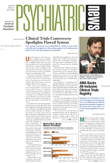It may come as a surprise, but it looks as though Alzheimer's patients who are mild-to-moderately severely ill can assess the quality of their lives better than their caretakers can.
Past studies have determined that Alzheimer's patients with mild-to-moderate dementia can accurately report their quality of life in many domains. And now a new study has found that caretakers of dementia patients generally rate the patients' quality of life lower than the patients themselves do, and the reason, it appears, is not that the patients lack the mental capacity to assess their own quality of life, but rather that the caretakers feel overburdened.
In this new study, reported in the June American Journal of Geriatric Psychiatry, Kristine Yaffe, M.D., a psychiatrist at the University of California, San Francisco, and coworkers had 91 patients with mild-to-moderately severe dementia rate themselves on their quality of life with the Dementia Quality of Life Questionnaire. That is, the patients had to report how often they felt happy, hopeful, and useful; how often they felt lonely, depressed, nervous, anxious, frustrated, embarrassed, and lonely; how often they found something that made them laugh or laugh with others; and how often they obtained pleasure from watching animals, listening to music, and so on.
Each patient's primary caretaker rated him or her in the same way, using the same instrument. Patients were also administered the Mini-Mental State Exam and the Geriatric Depression Scale, and caregivers also completed a Caregiver Burden Questionnaire and questions about how often patients were hostile or aggressive, sought attention, or engaged in sexually inappropriate behaviors.
The researchers then compared how the patients had rated themselves on quality of life with how their caretakers had done so and found that there was little agreement. The caretakers generally rated the patients' quality of life lower than the patients themselves had done.
To find out why, the investigators used results from the Mini-Mental State Exam, Geriatric Depression Scale, Caregiver Burden Questionnaire, and other questions caretakers had answered.
The reason, it turned out, is not that the patients lacked the mental capacity to assess their own quality of life, but rather that the caretakers felt burdened. In other words, it looks as though the caregivers had transferred their feelings about their own poor quality of life to the patients.
“When assessing subjective quality of life in patients with mild-to-moderate dementia, patients should be directly assessed because burdened caregivers are likely to underrate the quality of life of their relative with dementia,” Yaffe and her colleagues concluded.
The study was financed by the Alzheimer's Association.
Am J Geriatr Psychiatry 2004 12 272
